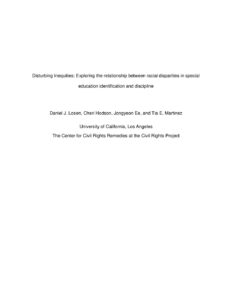Abstract
We merged data on the extent to which middle schools implemented school-wide positive behavior interventions and supports (SWPBIS) with data on disciplinary exclusions occurring in those schools across a period of 3 years. We conducted descriptive and multivariate analyses of variance to examine if (a) SWPBIS can be implemented with fidelity in middle school settings, (b) SWPBIS implementation is associated with reductions in disciplinary inequity, and (c) changes in disciplinary inequity vary with the proportion of students from low socio-economic and non-White backgrounds. Analysis of intervention fidelity data indicated that schools implemented the core features of SWPBIS based on training and support provided. Based on descriptive outcomes SWPBIS implementation was associated with (a) overall lower rates of ISS, the least severe form of disciplinary exclusion; (b) overall high rates of truancy, especially for AI/AN and Hispanic students; (c) some reductions in disciplinary exclusions for Hispanic and AI/AN students, but few for African-American students; and (4) few increases in the durations of disciplinary exclusions. School-level demographic factors did not appear to impact racial/ethnic inequity in schools implementing SWPBIS. Based on our findings we suggest a number of recommendations, including focused research on integrating behavioral science and critical race theory, training SWPBIS implementers in disaggregating discipline data by student race/ethnicity and interpreting data patterns, increasing meaningful integration of non-White parents into SWPBIS implementation practices, and holding implementers accountable for promoting culturally responsive systems and practices.
In compliance with the UC Open Access Policy, this report has been made available on eScholarship:
